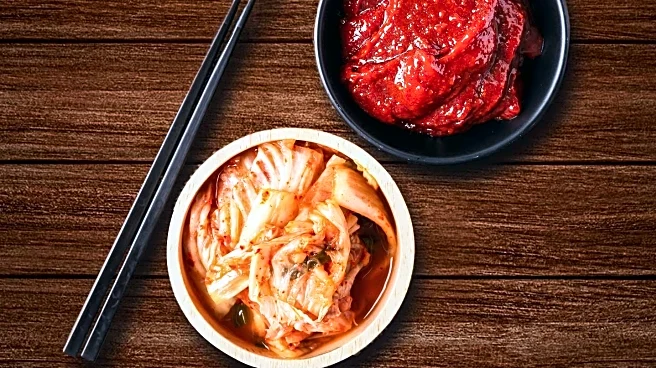What's Happening?
Korean fried chicken has seen a surge in popularity, highlighting a growing familiarity with Korean culture in the United States. This culinary trend can be traced back to an American cookbook from the era when African American soldiers were stationed in Korea during the Korean War. The dish has evolved and gained international recognition, with figures like chef Judy Joo, co-creator of Seoul Bird, and Suzie Tsai, CEO of Bonchon, discussing its journey and cultural significance. The dish's rise in popularity is seen as a symbol of cultural exchange and the blending of culinary traditions.
Why It's Important?
The increasing popularity of Korean fried chicken in the U.S. signifies a broader acceptance and integration of Korean culture into American society. This trend
reflects the dynamic nature of cultural exchange, where food becomes a medium for understanding and appreciating different traditions. The success of Korean fried chicken chains like Bonchon indicates a growing market for international cuisines, which can lead to economic opportunities for businesses and entrepreneurs in the food industry. Additionally, it highlights the role of food in bridging cultural gaps and fostering a sense of global community.
What's Next?
As Korean fried chicken continues to gain traction, it is likely that more restaurants and food chains will incorporate it into their menus, further expanding its reach. This could lead to increased competition among businesses specializing in Korean cuisine, prompting innovation and diversification in offerings. The trend may also encourage other international cuisines to enter the U.S. market, contributing to a more diverse culinary landscape. Stakeholders in the food industry may explore partnerships and collaborations to capitalize on this growing interest in Korean food.
Beyond the Headlines
The rise of Korean fried chicken in the U.S. not only reflects culinary trends but also underscores the broader cultural shifts occurring in society. It highlights how food can serve as a gateway to understanding and appreciating different cultures, promoting inclusivity and diversity. This development may also influence cultural perceptions and stereotypes, challenging traditional notions of cuisine and identity. As more people embrace Korean fried chicken, it could lead to a deeper appreciation of Korean culture and history, fostering cross-cultural dialogue and understanding.

















